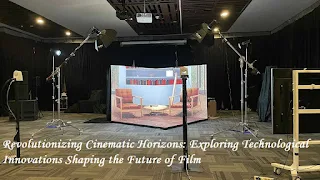Revolutionizing Cinematic Horizons: Exploring Technological Innovations Shaping the Future of Film
Revolutionizing Cinematic Horizons: Exploring Technological Innovations Shaping the Future of Film
Introduction: Exploring Technological Innovations Shaping the Future of Film
The realm of cinematic arts is undergoing a transformative evolution, propelled by a fusion of cutting-edge technologies and evolving societal dynamics. From the pioneering days of silent films to the era of CGI-laden spectacles, the film industry has continually reinvented itself. Today, an array of groundbreaking advancements promises to reshape storytelling, visual experiences, and production methodologies, ushering in an era of unparalleled innovation and immersive narratives.
Virtual Production and LED Screens:
Recent strides in virtual production, epitomized by its pivotal role in productions like Disney's "The Mandalorian," mark a watershed moment. Traditional green screens are yielding to LED screens capable of real-time backdrop projection. This technology immerses actors and creators within the narrative, enhancing realism while expediting production schedules and reducing post-production demands.
Deep Learning and AI:
Artificial intelligence and deep learning algorithms are revolutionizing multiple facets of cinematic creation. AI aids in script analysis, storyboarding, editing, and performance enhancement. By analyzing audience preferences, AI assists studios in strategic decision-making, predicting potential box office success, and shaping content creation.
5G Technology and Streaming:
The advent of 5G technology has transformed the landscape of film distribution and consumption. High-speed internet enables streaming platforms to deliver high-resolution content globally, empowering services like Netflix, Amazon Prime, and Disney+ to redefine the cinematic experience.
Augmented Reality (AR) and Virtual Reality (VR): Exploring Technological Innovations Shaping the Future of Film
AR and VR technologies are reshaping how audiences engage with films. VR headsets offer immersive cinematic experiences, while AR overlays digital elements onto the real world, blurring the line between fiction and reality, and enriching the viewer's interaction with narratives.
Sustainability in Film Production:
The film industry is embracing sustainable practices, from LED lighting on sets to reducing plastic use. Beyond ethical considerations, sustainable filmmaking promises long-term cost savings while aligning with environmental concerns.
Diversity and Inclusion:
A pivotal shift towards diversity and inclusion is transforming storytelling. Filmmakers recognize the importance of representing diverse narratives with casts and crews that mirror society. This trend not only addresses societal imperatives but also infuses creativity by introducing fresh perspectives.
Remote Collaboration Tools:
The COVID-19 pandemic accelerated the adoption of remote collaboration tools in filmmaking. These tools facilitate seamless collaboration among global talents, transcending geographical barriers and diversifying creative inputs.
Conclusion: Exploring Technological Innovations Shaping the Future of Film
The cinematic landscape stands at the brink of an exhilarating transformation, driven by technological innovation and evolving societal values. Virtual production, AI, 5G, AR, and VR are revolutionizing filmmaking and audience experiences. Sustainability and inclusivity have become intrinsic to the industry, reflecting evolving priorities. These innovations promise to redefine storytelling in ways that surpass current imagination. Stay tuned for the enigmatic offerings of the cinematic future!
